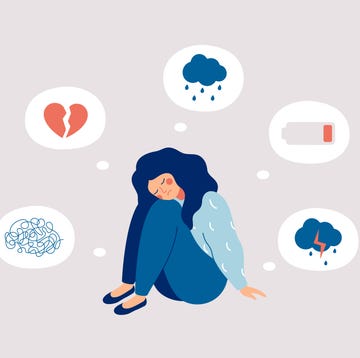Every item on this page was chosen by a Woman's Day editor. We may earn commission on some of the items you choose to buy.
17 Signs You're Having a Midlife Crisis
Here's what to do if you think you're experiencing a midlife crisis.

By the time most people reach middle age, they have been through more than one or two big changes in life. They may have changed careers multiple times, experienced loss, or raised children. In truth, many people have experienced all of the above by the time they are in their 40s or 50s. This is why a midlife crisis can come as such a surprise to some people. After experiencing five or so decades of all life's highs and lows, a midlife crisis can feel entirely different. But no matter how uncomfortable a midlife crisis might feel, it's incredibly normal (and very common). Just consider all the life changes that middle age brings.
Things like retirement, a newly empty nest, or physical/mental changes can be jarring. It's no wonder that so many people experience feeling lost, indecisive, or restless during this period of life. Knowing the specific signs of a midlife crisis is an important way to make sure that you're able to understand how you're feeling, identify the root of the feelings, and seek help and support from your peers or professionals. Though a midlife crisis can feel overwhelming, these steps will make things feel that much more manageable. In other words: They give you more time to focus on being happy. And what could be more important than that?
What is a midlife crisis?
Though the term midlife crisis is fairly common, it’s actually only existed since the mid-1960s, according to Psychology Today. Coined by psychologist Elliot Jacques, "midlife crisis" was originally used to describe the period of life where adults tend to “reckon with their mortality,” as the same Psychology Today article explains. In other words, the phenomenon can be a little more complicated than how it's often portrayed — it’s more than just someone purchasing a fancy car or picking up an unexpected hobby. As Baltimore-based therapist and co-founder of WithTherapy, Dr. Heather Z. Lyons tells Woman’s Day, a midlife crisis, in essence, is a struggle with one’s own finiteness.
“Our finiteness or mortality can become particularly salient when we experience health issues, experience transition, hit a milestone, or lose a loved one,” Lyons explains, emphasizing why midlife can be such a sensitive time for adults, and why it's often a time when adults feel an impulse to achieve and create more meaning in their lives than usual. It’s also a time when adults are at a greater risk to develop mood disorders like depression, Lyons adds.
What does a midlife crisis look like?
The ways in which a midlife crisis can manifest are numerous. As licensed professional counselor and founder/CEO of Mayfield Counseling Centers, Dr. Mark Mayfield, explains: "Often in the early forties to early fifties, an individual is confronted with their mortality and that 'half' their life is over. As a result, they try to make sense of their present and how it relates to their past and their future."
"This can be a great place to readjust goals and make peace with your past. Frequently, the question of, 'Am I enough?' is at the center of this stage of life. When someone cannot answer that question with an honest and vulnerable mindset they can spiral into chaos. As a result of this chaotic mindset, they may in turn make decisions that are out of impulse and out of a need to cope or numb."
Instead of making impulsive decisions in the midst of these feelings, Dr. Mayfield suggests using this moment as a time for serious self-reflection and adjustment, "I would suggest that we need to re-think the term 'midlife crisis' and replace it with something like a mid-life reflection."
How women experience midlife crises differently
Midlife crises are common for both men and women in middle age, but as an article from the Cleveland Clinic explains, midlife crises can present a little differently in women as compared to men. When you consider that many women experience the physical changes that come with menopause during mid-life, this makes sense. As the article goes on to outline, while men often feel "trapped" by life during their midlife crisis, women's main discomfort often comes from hormonal changes. In addition to seeing a doctor and learning ways to alleviate symptoms of menopause, Healthline suggests seeing a therapist, talking to friends, journaling, reading, and prioritizing healthy exercise and nutrition as ways to deal with a midlife crisis as a woman.
RELATED: 30 Best Self-Care Ideas to Actually Heal Your Mind and Soul
How to seek help for a midlife crisis
Being aware of the monumental changes (emotional, mental, and physical) that can occur when someone reaches middle-age is helpful — no matter what your age. “If you notice that a loved one has difficulty accomplishing daily tasks or attending to relationships it's time to reach out to them to talk with them about whether what they're experiencing is more serious,” Dr. Lyons says.
If you suspect you may be experiencing a midlife crisis, working with a therapist can be helpful. Follow the American Psychological Association's tips for finding a good therapist to ensure you work with a qualified professional who has background and expertise that will benefit you and your specific needs.
What are the common signs of a midlife crisis?
Here are 17 common warning signs that experts say can signal a midlife crisis in women.

Olivia Muenter is a freelance writer and former fashion and beauty editor who writes about fashion, beauty, lifestyle, relationships, travel, home decor, and more for Woman's Day and beyond. Her work has appeared in Bustle, Refinery 29, Glamour, Byrdie, Apartment Therapy, Philadelphia Magazine, and more. When she's not reading (or talking about reading on Bad on Paper, the bookish podcast she co-hosts), you can find Olivia working on her first novel, curating the perfect playlist, or shopping online.

50 Powerful Mental Health Quotes

14 Best Women's Wellness Retreats

Best Multivitamins for Women, According to Experts

30 Positive Affirmations for Mental Health
























